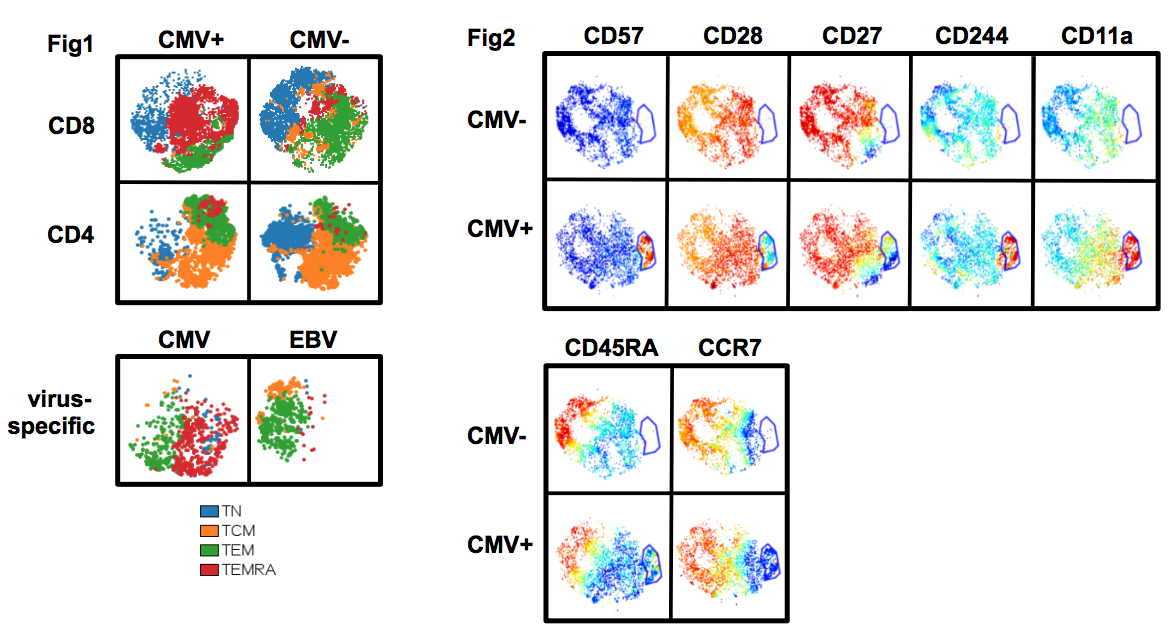Impact of Cytomegalovirus on the Immune System of Healthy Humans
W. Zhang, J. Robertson, G. Karadkhele, B. Johnson, C. Larsen
Emory Transplant Center, Emory University, Atlanta, GA
Meeting: 2019 American Transplant Congress
Abstract number: 57
Keywords: Cytomeglovirus, Epstein-Barr virus (EBV), Kidney/liver transplantation, T cells
Session Information
Session Name: Concurrent Session: Biomarkers, Immune Monitoring and Outcomes I
Session Type: Concurrent Session
Date: Sunday, June 2, 2019
Session Time: 2:30pm-4:00pm
 Presentation Time: 3:06pm-3:18pm
Presentation Time: 3:06pm-3:18pm
Location: Room 306
*Purpose: CMV is a frequent pathogen after transplantation. 2/3 of recipients harbor latent CMV and are at moderate risk. CMV- recipients divide into high or low risk groups based on the donor’s CMV status. CMV reactivation causes morbidity via direct viral effects but is also a risk factor for rejection. There is evidence that CMV low risk confers superior long term survival. The relative contribution of freedom from CMV disease and/or from rejection to this survival benefit is not known.
CMV has a major impact on the immune system occupying a disproportionate fraction of the memory pool. Memory can influence the vigor of anti-donor responses via heterologous immunity. CD57, CD28, PD-1, and CD244 have been proposed as biomarkers for rejection and infection. Given the overlap of these markers with those expressed on CMV specific memory we analyzed the coordinate expression of co-stimulatory, co-inhibitory, adhesion and senescence molecules on memory subsets and CMV and EBV-specific T cells using 18 color flow cytometry.
*Methods: Marker expression was assessed on memory subsets and virus-specific CD8 T cells from 24 CMV+ and 18 CMV- age-matched healthy controls (all EBV+). 11 EBV and 9 CMV tetramers were used for analysis. Traditional gating and semi-supervised dimensionality reduction tools were used iteratively to discover and validate novel expression patterns and subsets.
*Results: CMV seropositivity has highly significant age-independent effects resulting a reduction in naïve T cells in both CD4 and CD8 subsets (Fig1 viSNE plot). CMV drives expansion of CD4 TEM and CD8 TEMRA. CMV-specific T cells have significantly more TEMRA whereas EBV-specific T cells have more TCM. viSNE and Citrus identified the appearance of CD4+ and CD8+ populations with reduced costimulatory receptors CD28 and/or CD27 but increased expression of CD57, CD11a and co-inhibitor CD244 (Fig2). Rphenograph revealed 17 clusters of EBV and CMV tetramer+ cells. EBV-specific cells were enriched for CD28+CD57- TEM whereas CMV-specific cells were enriched for CD28-CD57+ TEM and CD28- TEMRA. Studies of belatacept and tacrolimus treated kidney recipients are underway.
*Conclusions: Latent CMV infection impacts both CD8 and CD4 subsets resulting in loss of naïve cells and expansion of populations associated with belatacept-resistant rejection. Exploration of donor-reactivity in the CMV memory pool and stratification based on CMV risk status should be considered in biomarker studies.
To cite this abstract in AMA style:
Zhang W, Robertson J, Karadkhele G, Johnson B, Larsen C. Impact of Cytomegalovirus on the Immune System of Healthy Humans [abstract]. Am J Transplant. 2019; 19 (suppl 3). https://atcmeetingabstracts.com/abstract/impact-of-cytomegalovirus-on-the-immune-system-of-healthy-humans/. Accessed March 5, 2026.« Back to 2019 American Transplant Congress

